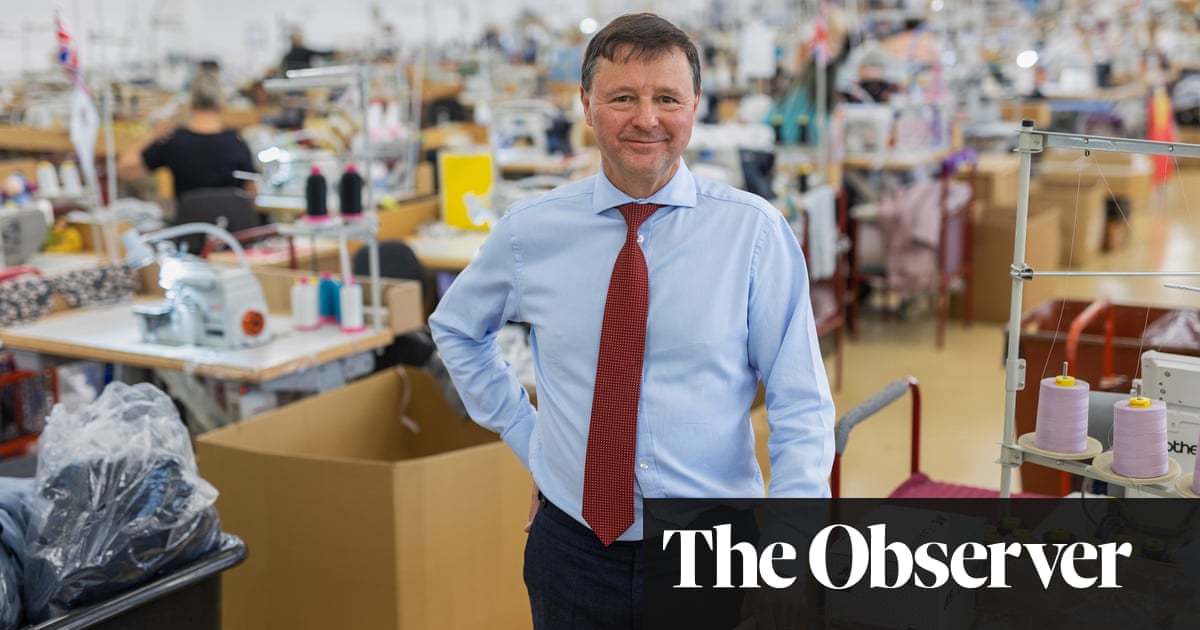Manufacturing’s coming home: UK fashion boss champions ‘reshoring’ - 4 minutes read

For three months over the spring and early summer he had a container full of fabric stuck in the port of Shanghai while the Chinese city was locked down because of Covid. Eventually, to avoid waiting any longer, he paid an extra €5,000 (£4,200) to have it air freighted, first to France, and then on to the East Midlands.
In response to severe disruption caused by Covid shutdowns in China and Russia’s invasion of Ukraine, more than a third of UK manufacturers have increased the number of suppliers they use, according to a survey by the industry group Make UK. More than three-quarters of these companies are increasing their use of UK suppliers.
However, the trend is far from straightforward, with questions over the higher production costs and Britain’s capacity to meet reshoring demand after decades of industrial decline and underinvestment. For many firms – especially those with major markets on the other side of the globe – turning to UK suppliers will make little sense.
Nieper has thrown his weight behind the local school, hoping to invest in a future generation of workers as one of the few business backers of an academy trust in Britain. Renamed the David Nieper Academy in 2016, the school once ranked among the worst in the country has grown to become the sixth most oversubscribed in Derbyshire, with almost 800 students.
“Everyone complains, saying: ‘You can’t get workers.’ Well they just need to go on and do something about it,” says Nieper. He recognises that businesses getting involved in education can be controversial (“The town was sceptical. What’s a private employer doing coming along?”) but says supporting the school is one way to help level up the local economy.
“Children might not have the opportunities they have in other areas, but it’s our job to make it happen,” says Hobbs, who grew up close to Alfreton but was one of the many who left. She came back to take on the challenge of turning the school around.
Textiles once formed the backbone of the industrial revolution, with former mining and mill towns like Alfreton at the industry’s heart. Today, however, as few as 3% of clothes worn in Britain are manufactured domestically. With globalisation enabling the offshoring of production, and amid a shift across advanced economies towards service sector activity, UK manufacturing has shrunk from more than a quarter of the economy in the 1970s to about 10% today.
The idea that Britain no longer makes things was among the many reasons former industrial towns voted overwhelmingly for Brexit. Spying an opportunity, Boris Johnson visited the David Nieper factory in 2016 on the Brexit campaign trail, using it to stitch together a Vote Leave flag in the workshop. He cracked jokes about the EU being a “badly designed undergarment” and quipped: “Knickers to all those who talk Britain down.”
On a walk around the David Nieper factory sites, dotted across Alfreton, there are few non-English voices to be heard. Nieper says there are some Polish and Lithuanian workers, while there are three Ukrainian refugees now at the school. He is proud to employ a mainly locally born workforce. “It’s much better if you can grow the economy from within the town.”
Nieper has faced disruption and higher costs since Brexit, but its boss says sales to France and Germany remain strong. Because its products are made in Britain, they qualify for zero-tariff status when sold in the EU, unlike the clothes originally produced in Asia that many rivals export. Most British retailers, however, sell garments made overseas, leading to a collapse in UK clothing exports to the EU.
Archie Norman, chair of Marks & Spencer, told the high street giant’s annual shareholder meeting that he would love to get more products from the UK, but “realistically we have got to be cost competitive, and we have lost the skillset” for domestic manufacturing. On a large scale I don’t think we will see [British clothing manufacturing] any time soon,” he said.
Nieper believes more companies need to get serious about investing in Britain to counter these headwinds. He is also critical of M&S for being part of the problem, having offshored its supply chain in recent decades to match fast fashion competitors. Such moves had a big impact on the Midlands and north of England, historically the home of the textiles industry.
Source: The Guardian
Powered by NewsAPI.org